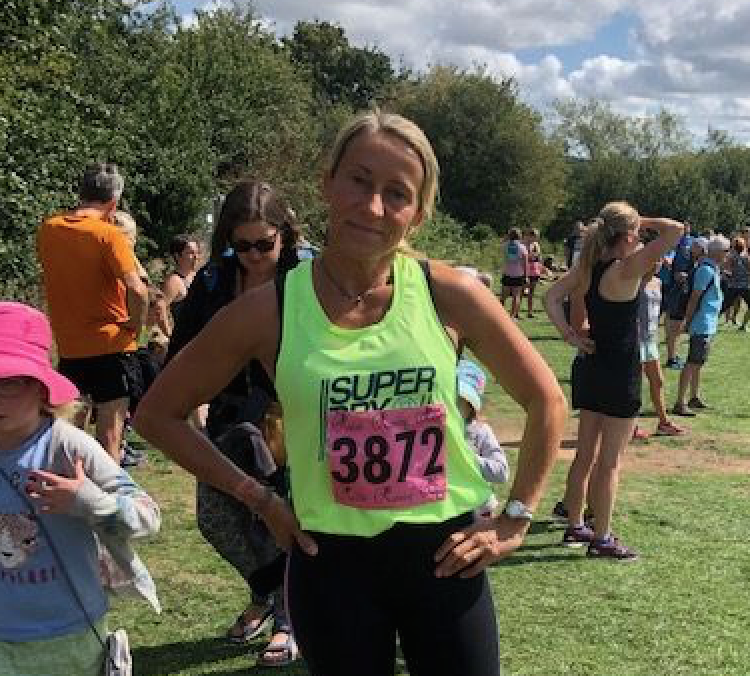Anna’s StorY
I was a little surprised when I received a recall letter to go back for another mammogram.
My cancer journey started in February 2018. My mother had had breast cancer at the age of 52, so my sister and I pushed to get onto the family history screening clinic at the RUH. This meant we had annual mammograms (despite being at a much younger age than the generic screening programme and despite there being no evidence of us carrying any faulty gene to increase our chances of getting breast cancer.)
Having not thought much about my annual check, I was a little surprised but not that concerned when I received a recall letter in the post four weeks later to go back for another mammogram and a more thorough check. The wording in the letter was very reassuring, so I put it out of my mind completely and got on with my everyday life as a personal trainer and busy working Mum to two young girls.
At the next appointment, I had a detailed discussion with the mammographer and doctor, who explained that they’d seen some small changes from the previous year’s mammogram: tiny white clustered micro calcifications had been identified in my left breast. That day I stayed in the RUH much longer than I expected, as they did a further mammogram and took a localised needle biopsy to obtain some cells containing these micro calcifications. I now felt more nervous and actually realised this could be something to be concerned about, although I was told the micro calcifications are often totally benign.
I went back for the needle biopsy results two weeks later and felt utter relief that while they weren’t totally ’normal’ cells, they weren’t identified as cancerous cells, rather a ‘changed’ cell called ‘atypical ductal carcinoma’. The specialist breast doctor was fantastic and thoroughly explained what this was – it was something they’d check annually in case of further changes but no further action or treatment was required. The doctor mentioned that she would like to get a larger cell sample just to be 100% sure it was reflective of what was happening in the wider breast tissue so I agreed, thinking: “well yes, of course it will be!”.
I had a small operation to get a larger biopsy from two areas in early May 2018. Two weeks later I was hit with a bombshell that I wasn’t expecting at all. The larger biopsy showed cells called ‘ductal carcinoma in situ’ (or DCIS) which is the final stage of abnormal cells before it becomes an invasive cancer. It had to be removed, and quickly, otherwise it was most likely to become an invasive cancer.
“I simply walked for the weeks post surgery. Nothing else was needed and it worked wonders.”
Due to the distribution of the DCIS throughout my left breast, the only option was a complete unilateral mastectomy. To say I was shell shocked is an understatement, especially as I was only 43, non-smoking, teetotal, healthy and fit!
On July 3rd 2018, I had my left breast removed – the reconstruction I had was done over several months using a tissue-expanding implant. This involved several hospital visits to inject saline into the temporary implant, ensure the pec muscle had stretched sufficiently and to check I was happy with the aesthetics of the reconstruction. It certainly helped that my mastectomy had been a skin and nipple sparing one, meaning the end reconstruction was very natural looking.
My final reconstructive surgery to replace the temporary implant with a permanent one was at the end of January 2019. My whole cancer ‘journey’ took up almost a year of my life.
What I can’t express enough is how being physically fit, healthy and active helped me enormously, in terms of recovery from all of the surgeries, my pain coping mechanism after the surgeries and my mental wellbeing. Although I couldn’t train hard, lift weights or do any fast cardio training, I simply walked for the weeks post surgery. Nothing else was needed and it worked wonders.
Once I had come to terms with what had to happen, I faced it with a positive mindset all the way. What good would dwelling in negative ‘poor me’ thoughts have done? I was lucky enough to have a strong support network around me too (which I know not everyone has.) Most of the time I maintained this attitude, even though I had to face other significant worries and challenges: financial (I was self employed, single and couldn’t work for months), the future (possible preventative surgery for me and maybe my two daughters in the future) and further emotional worry and stress when my sister was diagnosed with ovarian cancer just two months after my mastectomy. My sister and I had a BRCA genetic testing done in autumn 2018, which turned out to be negative – a huge relief.
I am now helping out local cancer support group We Get It in any way I can, talking about the benefits of keeping active for a quicker and stronger recovery, physically and mentally too.

